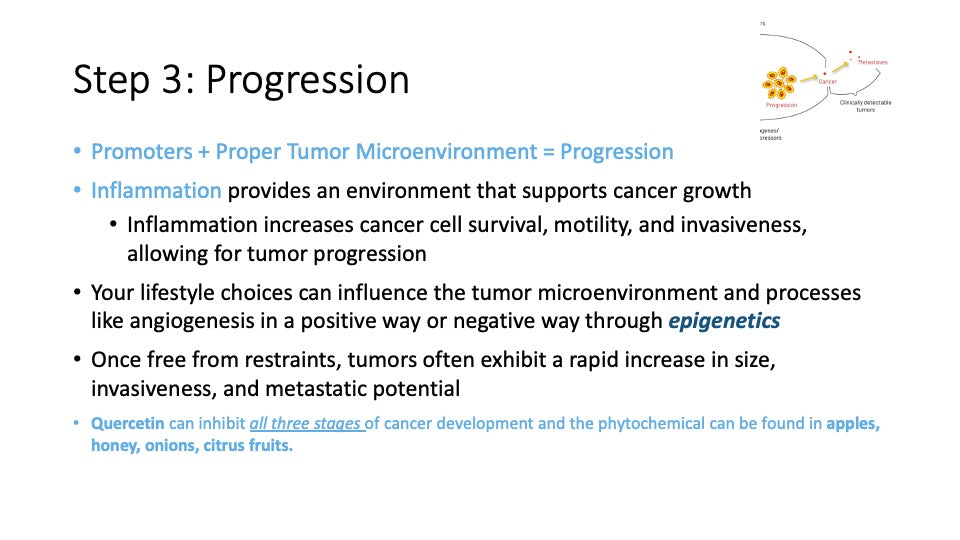
Progression
Progression is the final stage of cancer transformation. The microtumors become cancer. The term “progression” refers to the stepwise transformation of a benign tumor to a cancer, which occurs when alterations in tumor suppressor genes (genes responsible for keeping cancer at bay) and oncogenes (genes that can cause cancer when their normal function is altered) accumulate.
Once free from restraints, tumors often exhibit a rapid increase in size, invasiveness, and metastatic potential.
• Promoters + Proper Tumor Microenvironment = Progression
• Benign tumors can transform to cancers when alterations in tumor suppressor genes (genes responsible for keeping cancer at bay) and oncogenes (genes that can cause cancer when their normal function is altered) accumulate.
• Aging contributes to the accumulation of these gene mutations and other factors
• Inflammation provides an environment that supports cancer growth
• Inflammation increases cancer cell survival, motility, and invasiveness, allowing for tumor progression
• Your lifestyle choices can influence the tumor microenvironment and processes like angiogenesis in a positive way or negative way through epigenetics
• Once free from restraints, tumors often exhibit a rapid increase in size, invasiveness, and metastatic potential
• Quercetin can inhibit all three stages of cancer development and the phytochemical can be found in apples, honey, onions, and citrus fruits.
Chronic inflammation plays a key role in increasing cells survival, motility, and invasiveness, allowing for tumor progression.
Metastasis
The final stage is metastasis, which involves the spread of cancer cells from the primary site to other parts of the body through the bloodstream or the lymph system. Once metastasis has occurred, it is very difficult to eradicate the cancer and most patients will die of the cancer at some point.
Metastasis is a very complex process, and it is estimated that only 0.01% of cancer cells that enter the circulation will eventually survive and give rise to micro-metastasis.
Conclusion
Cancer usually takes many years to proceed through initiation, promotion, progression and metastasis. We all have microtumors, but it is our lifestyle, diet, and environment that will influence whether these microtumors become cancer.
While we can’t make the clock go backwards and reverse chronological age, our choices and habits can have a strong influence on biologic aging, along with decreasing chronic inflammation and epigenetics, reducing the chances of initiation and slowing promotion with healthy choices.

